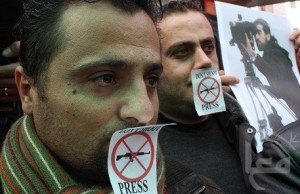 The National, April 3, 2010
The National, April 3, 2010
Anat Kam, 23, an Israeli journalist, goes on trial this month on charges of treason and espionage for leaking classified military documents to another Israeli journalist, who is now reportedly staying in London to avoid prosecution.
Ms Kam was detained in December and is under house arrest, but a gag order imposed by the military has meant there has been little news of her detention, at least not in Israel.
Prosecutors are allegedly seeking a 14-year sentence for Ms Kam, although because of the media blackout, there has been no comment from the government or the military on the case.
The gag is unusual in that it not only bans the Israeli media from reporting the details of Ms Kam’s arrest, but it also imposes a complete blackout on the fact that she has been detained.
Her arrest came to light early last month. It quickly spread through blogs and social media sites. But out of concern that the publicity might harm her case, and for their own personal freedom, most authors took their posts down.
Many have speculated that Ms Kam’s arrest is linked to a 2008 story in Haaretz that cited classified military documents ordering the targeted assassination of Palestinian militants – in direct violation of a 2006 Supreme Court order.
Ms Kam is alleged to have photo-copied the documents while working in a top general’s office during her mandatory national service a few years earlier, and supposedly passed those documents to the journalist, Uri Blau, who wrote the Haaretz story.
Mr Blau left Israel in December, around the same time that Ms Kam, then a reporter at the news website Walla, was arrested.
Mr Blau initially went to China, but is now reportedly in London. Some have said he is the one Israeli authorities want and that Ms Kam is the scapegoat.
Dov Alfon, the editor-in-chief of Haaretz, has said the suspected connection between Mr Blau and Ms Kam is “absurd”.
Haaretz and several other media outlets have challenged the media blackout and their appeal will be heard in a Tel Aviv court on April 12, two days before Ms Kam is to go on trial.
“Haaretz asked the court to lift the gag order, not just in the public interest but also to allow us to defend ourselves from this absurd allegation,” Mr Alfon told the Jewish Telegraph Agency, a US-based news agency.
“More than a year passed between the publication and her arrest, a year in which Uri Blau published several other front-page articles criticising the army’s conduct.”
A source with intimate knowledge of Ms Kam’s case confirmed that the state’s charges involved Mr Blau’s article.
The source added that Ms Kam had been arrested because of activities that allegedly occurred during her army service, not during her work as a journalist.
Eytan Lehman, one of Ms Kam’s lawyers, said he could not confirm or deny any details.
The gag order, he added, was imposed at the request of the prosecution and has been respected by his client and him.
“All of the leaks did not come from our side,” Mr Lehman said. “We can only suspect that they came from the other side.”
“While the gag is valid, I cannot speak about the case,” he said. “But I can say that it brings up very important issues of free speech and freedom of the press.”
These values, Mr Lehman said, are cornerstones a democratic state. “This case has a lot of importance in that aspect.”
The wall of silence surrounding Ms Kam’s detention has drawn sharp criticism from some journalists and free press advocates.
Lucie Morillon of Reporters without Borders, the Paris-based press freedom group, said: “We are worried by this gag order, we are calling for it to be lifted.”
Ms Morillon said it was “ridiculous” that while the rest of the world is talking about the issue, the Israeli media must remain silent.
“It’s a violation of free speech to prevent the Israeli media from discussing this issue,” she said.
Orly Halpern, a freelance journalist and Middle East analyst based in Jerusalem, agreed. “I am very worried that Israel would arrest a journalist – or anyone for that matter – and prevent people from knowing about it. These are the actions of an oppressive regime, not a democracy,” Ms Halpern said.
“Israel should have some kind of a protection for whistle-blowers,” another Israeli journalist said. “Even if they go against the state or the system, what [Ms Kam allegedly exposed] was the army breaking the law.”
The journalist, who asked to remain anonymous, said the blackout was one of the most worrisome aspects of the case. He said there had been an increase in such orders recently.
*Photo: Maan News Agency